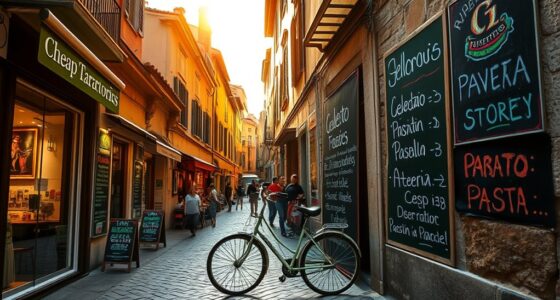When bringing souvenirs home from Italy, you need to follow specific customs rules to avoid problems. Certain items like antiques, artifacts, or natural products such as plants and shells may require permits or need to be declared. Protecting Italy’s cultural heritage means authorities are vigilant about illegal trafficking, so proper documentation is vital. To ensure a smooth process, stay informed about latest regulations and remember to declare anything suspicious. If you keep exploring, you’ll discover how to navigate customs easily.
Key Takeaways
- Italy enforces strict import rules for cultural artifacts, antiques, and protected natural materials requiring proper permits.
- Proper documentation is essential for souvenirs related to Italy’s cultural heritage to avoid confiscation or penalties.
- Natural souvenirs like plants, seeds, or animal products must be declared and may face restrictions or inspections.
- Always check current customs guidelines and keep receipts to facilitate smooth clearance at Italian borders.
- Supporting legal and documented souvenirs ensures compliance and helps preserve Italy’s cultural and natural treasures.

Have you ever wondered what rules govern bringing souvenirs home from your travels? When it comes to Italy, understanding the import regulations and cultural restrictions is essential to ensure a smooth journey back. Italy, as a member of the European Union, follows specific guidelines to protect its cultural heritage and natural environment. Knowing these rules helps you avoid unnecessary delays, fines, or confiscation of your prized souvenirs at customs.
First, you should be aware that certain items are restricted or require special permits. For example, archaeological artifacts, antiquities, or items made from protected species like certain woods, shells, or animals may be be restricted without the proper documentation. Italy is particularly strict about items that could threaten its cultural patrimony; bringing in artifacts or antiques without evidence of legal export can lead to serious penalties or confiscation. Before purchasing or packing such souvenirs, always verify their legality and whether they require export permits from Italian authorities.
Cultural restrictions are also in place to preserve Italy’s rich heritage. Many handcrafted items, such as traditional ceramics, artwork, and textiles, might be protected under cultural property laws. While most souvenirs are fine to bring home, you should avoid taking items that appear to be part of Italy’s cultural heritage unless you have proper documentation confirming they’ve been legally exported. This is especially relevant for items that seem old or unique, as authorities are vigilant about preventing illegal trafficking of cultural objects.
In addition to cultural restrictions, import regulations concerning natural products are equally important. Italy has strict rules about plants, seeds, and animal products. Bringing in fresh food, certain dried herbs, or plant-based souvenirs can sometimes be problematic, especially if they are from protected species or ecosystems. You should declare any organic or natural souvenirs at customs, and be prepared for inspections. Failure to declare items or attempts to smuggle restricted products can result in fines or the confiscation of your souvenirs.
To make your return as hassle-free as possible, always check the latest guidelines from Italian customs and your home country’s regulations. Packaging souvenirs securely, keeping receipts, and having documentation ready for items of cultural or natural significance can speed up the process. When in doubt, declare your souvenirs and seek guidance from customs officers. By respecting Italy’s import regulations and cultural restrictions, you not only obey the law but also help preserve the country’s cultural and natural treasures for future generations. Additionally, being aware of AI-powered tools can assist travelers in understanding complex regulations more efficiently.
Frequently Asked Questions
Are There Any Restrictions on Bringing Food Souvenirs Into Italy?
When bringing food souvenirs into Italy, you should be aware of local food restrictions and souvenir packaging guidelines. Customs may restrict or require declarations for certain products like dairy, meat, or fresh produce to protect local agriculture. Always check the regulations beforehand, make sure your souvenirs are properly packaged, and declare them if needed. This way, you avoid delays or confiscation, making your entry smooth and hassle-free.
Can I Declare Multiple Souvenirs at Customs Simultaneously?
You might think declaring multiple souvenirs at customs is complicated, but it’s straightforward if you follow proper procedures. Customs procedures often permit you to declare multiple items at once, especially if they’re within allowed limits. Be prepared to fill out a single declaration form listing all souvenirs, and present them together. This simplifies your process, reduces delays, and ensures you comply with regulations, making your entry smoother.
What Are the Penalties for Undeclared Souvenirs?
If you fail to declare souvenirs, you risk facing customs penalties for souvenir violations. Customs authorities may seize your items, impose fines, or even confiscate your belongings. The penalties depend on the value and type of souvenirs, and ignoring declaration rules can lead to more serious legal issues. To avoid trouble, always declare your souvenirs honestly and follow customs regulations, ensuring a smooth and hassle-free departure.
Are There Specific Regulations for Antique or Vintage Souvenirs?
Antique and vintage souvenirs demand diligent documentary details. You should be aware that antique valuation and vintage identification are essential to avoid accidental infringements. Customs often scrutinize specific souvenirs, requiring proof of authenticity or age. You might need to provide receipts, certificates, or detailed descriptions. Be prepared to face fines or confiscation if you carry antique or vintage items without proper documentation. Always double-check regulations to protect your treasures and travel smoothly.
How Do I Handle Souvenirs That Slightly Exceed Limits?
If your souvenirs slightly exceed the limits, you should handle them carefully by reviewing packaging guidelines to guarantee they’re well-protected. It’s also important to have a clear souvenir valuation, as customs officials may ask for proof of value. Be honest about the excess amount; sometimes, paying a small duty or tax can smoothen your process. Always stay informed and prepared to avoid delays or confiscation.
Conclusion
Now that you know the ins and outs of Italian souvenir customs regulations, you can confidently bring home a piece of Italy without surprises. Many believe that following customs rules is just about avoiding fines, but it’s also about respecting Italy’s rich history and environment. By adhering to these guidelines, you help preserve Italy’s treasures for future travelers. So, embrace the process—your thoughtful choices truly make a difference in protecting Italy’s beautiful heritage.









